Blog

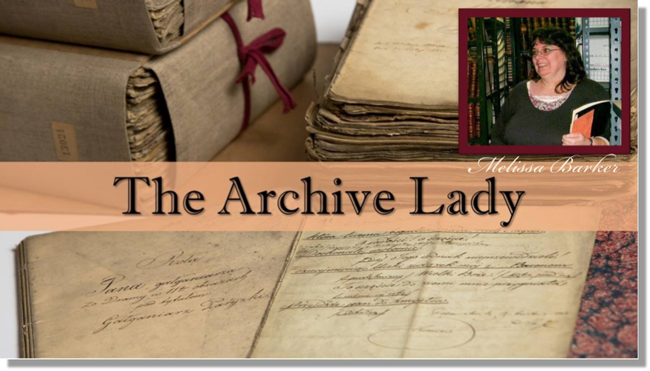
How to Archive Family History Documents
Jennifer recently wrote in with a question about how to archive family history documents, and I knew just who to turn to: The Archive Lady! Melissa Barker is joining the Genealogy Gems Podcast and blog to help answer your questions about your precious possessions.

Let’s get right to Jennifer’s question:
Lisa,
I recently received my grandfather’s birth certificate from my cousin. My family knows that I am researching our family tree and are not surprised when I ask them for information or to take a picture of family gatherings and send it to me. Most of my mother’s side of the family live in Wisconsin and I am in New Hampshire, so I don’t get to visit with them often. The birth certificate is very old and fragile and I’m wondering how do I store it so it will be around for future generations.
Thank you for any ideas.
Jennifer
It’s fabulous to find genealogical documents online, but there’s nothing like touching and possessing the original. I reached out to our Archive Lady here at Genealogy Gems, Melissa Barker to get her advice on archiving family history documents.
(Full disclosure: the links below are affiliate links that will take you to the products Melissa’s recommends in Amazon. While there’s no additional cost to you, we will be compensated for the referral. Thank you for helping us keep this blog and the Genealogy Gems Podcast free!)
How to Archive Family History Documents from the Archive Lady
“Jennifer, what a wonderful treasure to receive, your grandfather’s birth certificate. Preserving original records such as birth certificates is so very important for future generations.
First, I would suggest that you scan the certificate or take a photograph of it so that it is preserved digitally. Then the certificate needs to be encapsulated in an archival sleeve. Usually these sleeves are made from Mylar, Polypropylene or Polyester and can be bought at any online archival store. These sleeves can be top loading or they can be open on two sides, which are called L-sleeves. Place the certificate in the sleeve for the first layer of protection.
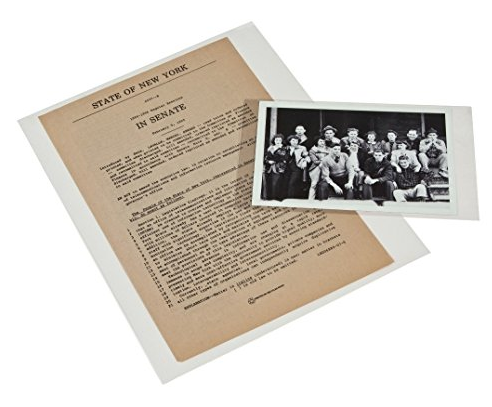 Then I suggest that you place the encapsulated certificate in an archival file folder and place in an archival Hollinger box. This will give you 3-layers of archival protection for your certificate.
Then I suggest that you place the encapsulated certificate in an archival file folder and place in an archival Hollinger box. This will give you 3-layers of archival protection for your certificate.
Store all documents and photographs in a cool, dark and dry place.
Following these easy steps will ensure that your grandfather’s birth certificate will be enjoyed for generations to come!”
.
More Resources for How to Archive Your Family History
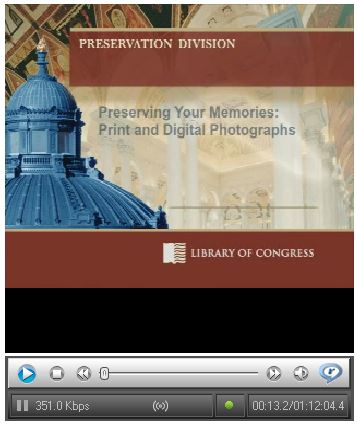 Thank you to Melissa for helping Jennifer and all our readers understand how to archive family history documents in proper way. The Library of Congress has a FREE video about how to create and properly preserve digital or print archival scrapbooks.
Thank you to Melissa for helping Jennifer and all our readers understand how to archive family history documents in proper way. The Library of Congress has a FREE video about how to create and properly preserve digital or print archival scrapbooks.
It’s a 72-minute video by various experts with a downloadable transcript on these topics:
- Basic preservation measures one can do at home for long-lasting albums and scrapbooks
- Pros and cons of dismantling old scrapbooks and albums in poor condition
- How to address condition problems
- Preservation considerations for digital scrapbooks and albums
- How to participate in the Library’s Veterans History Project.
And here on the Genealogy Gems blog we have an article for you about understanding the impact that humidity can have you on your family history collection. Click here to read Humidity and Your Family Archive: Why It Matters.
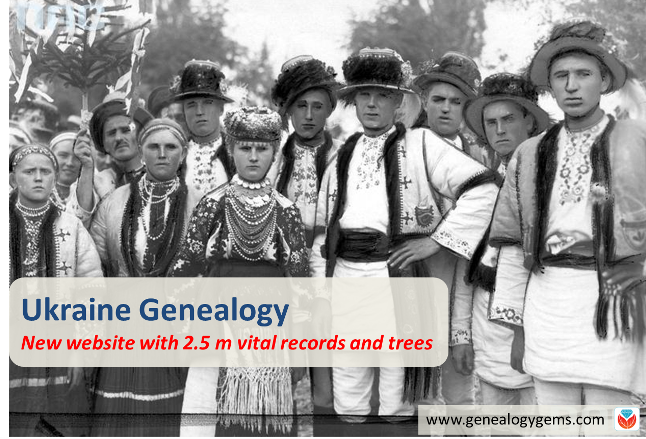
NEW Ukraine Genealogy Website Tops List of New Genealogy Records Online
Read all about a new free Ukraine genealogy website, Yorkshire parish records, English workhouse records, German vital records and digitized newspaper coverage of England, Ireland and Scotland.

A New Ukraine Genealogy Website! Vital records and family trees
A new, free Ukraine genealogy website has launched with free family-tree building capability and an enormous database of nearly 300 years of genealogical records from present-day Ukraine. “The database includes 2.56 million people and is expected to reach 4 to 5 million in 2019,” reports EuroMaidan Press. “The access to its contents is and will remain free of charge. The sources of data are manifold: birth registers, fiscal and parish censuses, lists of nobility, voters, the military, and victims of repressions, address directories, and other documents produced under the Tsardom of Muscovy, Russian and Habsburg Empires, Poland and the Soviet Union. A Roman-letter version of the data index is reportedly to be enabled in the coming months.”
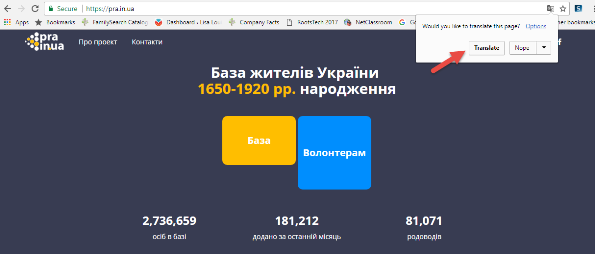
To translate the site, bring it up in Google Chrome and right-click.
The family tree-building feature has already proven incredibly popular, reports the same article: “nearly 18 thousand trees have been created in the first couple of days following the official inauguration of the site.” Automated tree-matching hinting will apparently be added in July 2017.
If you have Ukrainian roots, you may also want to read this article about how to request KGB files on relatives.
British Newspaper Archive: New content and free webinar!
The following historical newspaper coverage has been added to the British Newspaper Archive. They add about 100,000 pages every week–learn more about what they do in the free webinar, below.
- England.
- London: The Kilburn Times.
- Essex: The Southend Standard and Essex Weekly Advertiser from Southend-on-Sea.
- Hertfordshire: Watford Observer, for the town of Watford; added 1879-1886 to this paper’s coverage.
- Staffordshire: The Staffordshire Chronicle from the county town of Stafford.
- West Yorkshire: Wharfedale & Airdale Observer, published in Otley.
- Ireland. Londonderry: Northern Constitution/Coleraine Constitution (1888-1887).
- Scotland: Rothesay Chronicle, covering the Isle of Bute, Isle of Arran, and the mainland. Added coverage for 1884-1892.
More Irish newspapers: Findmypast has added 20th-century coverage of Dublin in the form of about 155,000 news articles from The Catholic Standard. (Limit your search to this paper by using the filters along the left side of the webpage.) The coverage includes weekly news reports dating from 1933-1949 and 1951-1957.
England
1861 workhouse inmates. Ancestry.com subscribers can now search indexed images of a new collection, England and Wales, Long-Term Workhouse Inmates, 1861. “This collection comprises records and images from a volume listing every adult ‘pauper’ in each Workhouse in England and Wales, who had been resident there for five or more years in 1861,” states the collection description. The report was in response to a government mandate to record long-term residents of workhouses. “The report was printed on 30 July 1861 and listed 14,216 adults,” continues the collection description. “When compared with the total workhouse population of approximately 67,800 adult workhouse inmates (excluding vagrants) the percentage of long term inmates was just over 21%.”
Yorkshire parish records. Findmypast has published these new church record collections for Yorkshire:
- Yorkshire Parish Registers and Bishop’s Transcripts. Over 11,000 browse-only volumes of baptisms, marriages, and deaths dating back to 1538.
- Yorkshire baptisms. Over 600,000 records have been added for Sheffield and the East Riding to this database, which now has more than 5 million entries.
- Yorkshire banns. Over 30,000 entries have been added for Sheffield and the East Riding.
- Yorkshire marriages. Over 400,000 entries have been added for Sheffield and the East Riding. The database now has nearly 3 million records.
- Yorkshire burials. Over half a million new burials have been added for Sheffield and the East Riding; this database now tops 4.7 million.
Germany: Church and civil records
Ancestry.com has a new browse-only collection of church records from 42 communities in Erfurt, the capital of Thuringia. According to a collection description, “The vast majority of the church records are from Protestant communities, but some Catholic and Jewish communities are also included. In one case, records from the ‘Kaufmannsgemeinde’ or merchants’ community are included.”
Also at Ancestry.com is a new collection of browse-only civil marriage records. Bischofswerda, Germany, Marriages, 1876-1922 includes government records of marriages from Bischofswerda and 11 other communities from the district of Bautzen; date ranges of records from each may vary.
Subscribe to the free weekly Genealogy Gems newsletter! You’ll stay up-to-date with the latest genealogy records online and genealogy news you want to know–like the recent announcement of the end of FamilySearch microfilm lending and RootsMagic’s new ability to sync with Ancestry.com.

Disclosure: This post contains affiliate links and Genealogy Gems will be compensated if you make a purchase after clicking on these links. Thank you for supporting Genealogy Gems!
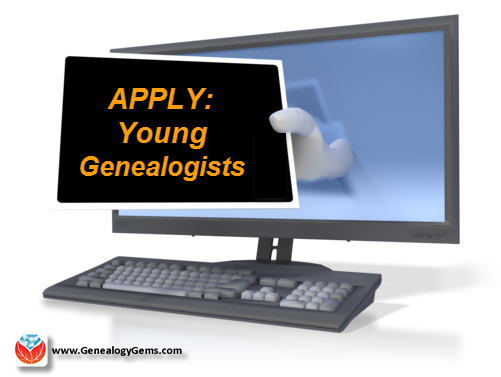
Young Genealogist Scholarship: APG Now Accepting Applications

WHEAT RIDGE, Colo., 1 July 2017 – The Association of Professional Genealogists (APG) is now accepting applications for the APG Young Professional Scholarship. The scholarship goes to a young professional or a student who aspires to a professional career in genealogy. The scholarship awards a registration for the APG Professional Management Conference (PMC) and a stipend of up to ,000 to defray costs of travel and lodging at the conference. The winner will be announced in August 2017 for attendance at the APG PMC 2017, which will take place near Washington, DC, on 29 September to 1 October 2017.
“Genealogy is not just your grandmother’s hobby anymore!” said Billie Stone Fogarty, APG President. “It is now an exciting field for the young professional and APG is proud to highlight the outstanding newcomers to our field with this scholarship to the conference designed by and for the professional genealogist.”
APG Young Professional Scholarship Eligibility and Application Details
Eligible applicants are any current or aspiring genealogy professional between the ages of 18 and 29 as of 1 January of 2017. You may apply for yourself, or on behalf of a worthy candidate.
Applications should contain the following: name; address; primary contact phone number; email address; school name and/or school address (if applicable); list of extracurricular activities (including student organizations and volunteer activities); a general letter of recommendation; a letter of recommendation from an individual who has witnessed the applicants interest in genealogy; and short answers (500 to 750 words) to two questions. The questions are:
1) Discuss a specific record collection, media, digital source or other resource that has significantly changed your perspective about family history or research strategy along with the pros and cons of that record source, and how you used it to resolve a genealogical problem.
2) What do you envision a genealogical career will encompass in the next five years and how do you see yourself involved then?
The application is available online at http://apgen.org/blog/wp-




